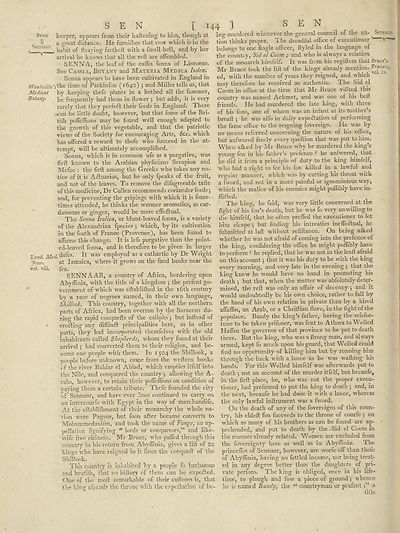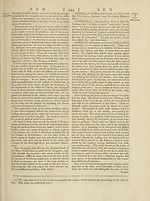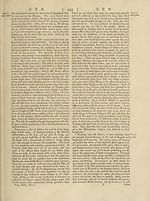Encyclopaedia Britannica, or, a Dictionary of arts, sciences, and miscellaneous literature : enlarged and improved. Illustrated with nearly six hundred engravings > Volume 19, Scripture-SUG
(154) Page 144
Download files
Complete book:
Individual page:
Thumbnail gallery: Grid view | List view

SEN
[ H4 ]
SEN
S-cnn
keeper.
Sennaar.
appears from their haftening to him, though at
a great diftance. He furnifhes that cow which is in the
, habit of flraying fartheft with a fmall bell, and by her
arrival he knows that all the reft are affembled.
SENNA, the leaf of the caflia fenna of Linnaeus.
See Cassia, Botany and Materia Medica Index.
Senna appears to have been cultivated in England in
Woodville' 1 the time of Parkinfon (1640) 5 and Miller tells us, that
Medical by keeping thefe plants in a hotbed all the fummer,
■Botany. ]ie frequently had them in flower ; but adds, it is very
rarely that they perfect their feeds in England. There
-can be little doubt, however, but that feme of the Bri-
tifli pofleflions may be found well enough adapted to
the growth of this vegetable, and that the patriotic
views of the Society for encouraging Arts, &c. which
has offered a reivard to thofe who fucceed in the at¬
tempt, will be ultimately accompliftied.
Senna, which is in common ufe as a purgative, was
firft known to the Arabian phyficians Serapion and
Mefue : the firft among the Greeks who takes any no¬
tice of it is Aftuarius, but he only fpeaks of the fruit,
and not of the leaves. To remove the difagreeable tafte
of this medicine, Dr Cullen recommends coriander feeds j
and, for preventing the gripings with which it is fome-
times attended, he thinks the warmer aromatics, as car¬
damoms or ginger, would be more effeftual.
The Senna Italica, or blunt-leaved fenna, is a variety
of the Alexandrian fpecies 5 which, by its cultivation
in the fouth of France (Provence), has been found to
affume this change. It is lefs purgative than the point¬
ed-leaved fenna, and is therefore to be given in larger
lond Med. d°fes. It was employed as a cathartic by Dr Wright
at Jamaica, where it grows on the fand banks near the
fea.
SENNAAR, a country of Africa, bordering upon
Abyflinia, with the title of a kingdom ; the prefent go¬
vernment of which -was eftablifhed in the 16th century
by a race of negroes named, in their own language,
Shil/ook. This country, together with all the northern
parts, of Africa, had been overrun by the Saracens du¬
ring the rapid conquefts of the caliphs ; but inftead of
erecting any diftinfl principalities here, as in other
parts, they had incorporated themfelves with the old
inhabitants called Shepherds, whom they found at their
arrival 5 had converted them to their religion, and be¬
come one people with them. In 1504 the Shillook, a
people before unknown, came from the weftern banks
of the river Bahiar el Abiad, which empties itfelf into
the Nile, and conquered the country $ allowing the A-
rabs, however, to retain their poffeflions on condition of
paying them a certain tribute. Thefe founded the city
of Sennaar, and have ever fince continued to carry on
an intercourfe with Egypt in the way of merchandife.
At the eftablifhment of their monarchy the whole na¬
tion w'ere Pagans, but foon after became converts to
Mohammedanifm, and took the name of Funge, an ap¬
pellation fignifying w lords or conquerors,” and like-
wife free citizens. Mr Bruce, who paffed through this
country in his return from Abyflinia, gives a lift of 2o
Pings who have reigned in it fince the conqqeft of the
'Shillook.
This country is inhabited By a people fo barbarous
and brutith, that no hiftory of them can be expedled.
One of the moft remarkable of their cuftoms is, that
the king afeends the throne with the expcdlation of be-
Sermaa
your.
vol. viii.
ing murdered whenever the general council of the na¬
tion thinks proper. The dreadful office of executioner
belongs to one Angle officer, ftyled in the language of
the country, Sid el Coom ; and who is always a relation
of the monarch himfelf. It was from his regifters that Bruce's
Mr Bruce took the lift of the kings already mention-
ed, with the number of years they reigned, and which vo
may therefore be received as authentic. T he Sid el
Coom in office at the time that Mr Bruce vifited this
country was named Achmet, and was one of his beft
friends. He had murdered the late king, with three
of his fons, one of whom was an infant at its mother’s
breaft ; he was alfo in daily expedition of performing
the fame office to the reigning fovereign. He was by
no means referved concerning the nature of his office,
but anfwered freely every queftion that was put to him.
When afis.ed by Mr Bruce wffiy he murdered the king’s
young fon in his father’s prefence ? he aniwered, that
he did it from a principle of duty to the king himfelf,
who had a right to fee his ion killed in a lawdul and
regular manner, wfiich w'as by cutting his throat with
a fvvord, and not in a more painful or ignominious way,
which the malice of his enemies might poflibly have in-
flidfed.
The king, he faid, was very little concerned at the
fight of his fon’s death, but he was fo very unwilling to
die himfelf, that he often preffed the executioner to let
him efcapey but finding his intreaties ineffedfual, he
fubmitted at laft without refiftance. On being alked
whether he was not afraid of coming into the prefence of
the king, confidering the office he might poflibly have
to perform ? he replied, that he was not in the leaft afraid
on this account $ that it was his duty to be with the king
every morning, and very late in the evening j that the
king knew he would have no hand in promoting his
death j but that, when the matter was abfolutely deter¬
mined, the reft was only an affair of decency } and it
would undoubtedly be his own choice, rather to fall by
the hand of his own relation in private than by a hired
affaflin, an Arab, or a Chriftian Have, in the fight of the
populace. Baady the king’s father, having the misfor¬
tune to be taken prifoner, was fent to Atbara to Welled
Haffan the governor of that province to be put to death
there. But the king, who was a ftrong man, and always
armed, kept fo much upon his guard, that Welled could
find no opportunity of killing him but by running him
through the back with a lance as he was waffling his
hands. For this Welled himfelf was afterwards put to
death ; not on account of the murder itfelf, but becaufe,
in the firft place, he, who was not the proper execu¬
tioner, had prefumed to put the king to death 5 and, in
the next, becaufe he had done it with a lance, whereas
the only lawful inftrument was a fword.
On the death of any of the fovereigns of this coun¬
try, his eldeft fon fucceeds to the throne of courfe ; on
which as many of his brothers as can be found are ap¬
prehended, and put to death by the.Sid el Coom in
the manner already related. Women are excluded from
the fovereignty here as well as in Abyffinia. the
princeffes of Sennaar, however, are worfe off than thofe
of Abyflinia, having no fettled income, nor being treat¬
ed in any degree better than the daughters of pri¬
vate perfons. The king is obliged, once in his life¬
time, to plough and fow a piece of ground whence
he is named Baady, the “ countryman or peafanta
[ H4 ]
SEN
S-cnn
keeper.
Sennaar.
appears from their haftening to him, though at
a great diftance. He furnifhes that cow which is in the
, habit of flraying fartheft with a fmall bell, and by her
arrival he knows that all the reft are affembled.
SENNA, the leaf of the caflia fenna of Linnaeus.
See Cassia, Botany and Materia Medica Index.
Senna appears to have been cultivated in England in
Woodville' 1 the time of Parkinfon (1640) 5 and Miller tells us, that
Medical by keeping thefe plants in a hotbed all the fummer,
■Botany. ]ie frequently had them in flower ; but adds, it is very
rarely that they perfect their feeds in England. There
-can be little doubt, however, but that feme of the Bri-
tifli pofleflions may be found well enough adapted to
the growth of this vegetable, and that the patriotic
views of the Society for encouraging Arts, &c. which
has offered a reivard to thofe who fucceed in the at¬
tempt, will be ultimately accompliftied.
Senna, which is in common ufe as a purgative, was
firft known to the Arabian phyficians Serapion and
Mefue : the firft among the Greeks who takes any no¬
tice of it is Aftuarius, but he only fpeaks of the fruit,
and not of the leaves. To remove the difagreeable tafte
of this medicine, Dr Cullen recommends coriander feeds j
and, for preventing the gripings with which it is fome-
times attended, he thinks the warmer aromatics, as car¬
damoms or ginger, would be more effeftual.
The Senna Italica, or blunt-leaved fenna, is a variety
of the Alexandrian fpecies 5 which, by its cultivation
in the fouth of France (Provence), has been found to
affume this change. It is lefs purgative than the point¬
ed-leaved fenna, and is therefore to be given in larger
lond Med. d°fes. It was employed as a cathartic by Dr Wright
at Jamaica, where it grows on the fand banks near the
fea.
SENNAAR, a country of Africa, bordering upon
Abyflinia, with the title of a kingdom ; the prefent go¬
vernment of which -was eftablifhed in the 16th century
by a race of negroes named, in their own language,
Shil/ook. This country, together with all the northern
parts, of Africa, had been overrun by the Saracens du¬
ring the rapid conquefts of the caliphs ; but inftead of
erecting any diftinfl principalities here, as in other
parts, they had incorporated themfelves with the old
inhabitants called Shepherds, whom they found at their
arrival 5 had converted them to their religion, and be¬
come one people with them. In 1504 the Shillook, a
people before unknown, came from the weftern banks
of the river Bahiar el Abiad, which empties itfelf into
the Nile, and conquered the country $ allowing the A-
rabs, however, to retain their poffeflions on condition of
paying them a certain tribute. Thefe founded the city
of Sennaar, and have ever fince continued to carry on
an intercourfe with Egypt in the way of merchandife.
At the eftablifhment of their monarchy the whole na¬
tion w'ere Pagans, but foon after became converts to
Mohammedanifm, and took the name of Funge, an ap¬
pellation fignifying w lords or conquerors,” and like-
wife free citizens. Mr Bruce, who paffed through this
country in his return from Abyflinia, gives a lift of 2o
Pings who have reigned in it fince the conqqeft of the
'Shillook.
This country is inhabited By a people fo barbarous
and brutith, that no hiftory of them can be expedled.
One of the moft remarkable of their cuftoms is, that
the king afeends the throne with the expcdlation of be-
Sermaa
your.
vol. viii.
ing murdered whenever the general council of the na¬
tion thinks proper. The dreadful office of executioner
belongs to one Angle officer, ftyled in the language of
the country, Sid el Coom ; and who is always a relation
of the monarch himfelf. It was from his regifters that Bruce's
Mr Bruce took the lift of the kings already mention-
ed, with the number of years they reigned, and which vo
may therefore be received as authentic. T he Sid el
Coom in office at the time that Mr Bruce vifited this
country was named Achmet, and was one of his beft
friends. He had murdered the late king, with three
of his fons, one of whom was an infant at its mother’s
breaft ; he was alfo in daily expedition of performing
the fame office to the reigning fovereign. He was by
no means referved concerning the nature of his office,
but anfwered freely every queftion that was put to him.
When afis.ed by Mr Bruce wffiy he murdered the king’s
young fon in his father’s prefence ? he aniwered, that
he did it from a principle of duty to the king himfelf,
who had a right to fee his ion killed in a lawdul and
regular manner, wfiich w'as by cutting his throat with
a fvvord, and not in a more painful or ignominious way,
which the malice of his enemies might poflibly have in-
flidfed.
The king, he faid, was very little concerned at the
fight of his fon’s death, but he was fo very unwilling to
die himfelf, that he often preffed the executioner to let
him efcapey but finding his intreaties ineffedfual, he
fubmitted at laft without refiftance. On being alked
whether he was not afraid of coming into the prefence of
the king, confidering the office he might poflibly have
to perform ? he replied, that he was not in the leaft afraid
on this account $ that it was his duty to be with the king
every morning, and very late in the evening j that the
king knew he would have no hand in promoting his
death j but that, when the matter was abfolutely deter¬
mined, the reft was only an affair of decency } and it
would undoubtedly be his own choice, rather to fall by
the hand of his own relation in private than by a hired
affaflin, an Arab, or a Chriftian Have, in the fight of the
populace. Baady the king’s father, having the misfor¬
tune to be taken prifoner, was fent to Atbara to Welled
Haffan the governor of that province to be put to death
there. But the king, who was a ftrong man, and always
armed, kept fo much upon his guard, that Welled could
find no opportunity of killing him but by running him
through the back with a lance as he was waffling his
hands. For this Welled himfelf was afterwards put to
death ; not on account of the murder itfelf, but becaufe,
in the firft place, he, who was not the proper execu¬
tioner, had prefumed to put the king to death 5 and, in
the next, becaufe he had done it with a lance, whereas
the only lawful inftrument was a fword.
On the death of any of the fovereigns of this coun¬
try, his eldeft fon fucceeds to the throne of courfe ; on
which as many of his brothers as can be found are ap¬
prehended, and put to death by the.Sid el Coom in
the manner already related. Women are excluded from
the fovereignty here as well as in Abyffinia. the
princeffes of Sennaar, however, are worfe off than thofe
of Abyflinia, having no fettled income, nor being treat¬
ed in any degree better than the daughters of pri¬
vate perfons. The king is obliged, once in his life¬
time, to plough and fow a piece of ground whence
he is named Baady, the “ countryman or peafanta
Set display mode to:
![]() Universal Viewer |
Universal Viewer | ![]() Mirador |
Large image | Transcription
Mirador |
Large image | Transcription
Images and transcriptions on this page, including medium image downloads, may be used under the Creative Commons Attribution 4.0 International Licence unless otherwise stated. ![]()
| Permanent URL | https://digital.nls.uk/192697284 |
|---|
| Attribution and copyright: |
|
|---|
| Description | Ten editions of 'Encyclopaedia Britannica', issued from 1768-1903, in 231 volumes. Originally issued in 100 weekly parts (3 volumes) between 1768 and 1771 by publishers: Colin Macfarquhar and Andrew Bell (Edinburgh); editor: William Smellie: engraver: Andrew Bell. Expanded editions in the 19th century featured more volumes and contributions from leading experts in their fields. Managed and published in Edinburgh up to the 9th edition (25 volumes, from 1875-1889); the 10th edition (1902-1903) re-issued the 9th edition, with 11 supplementary volumes. |
|---|---|
| Additional NLS resources: |
|

